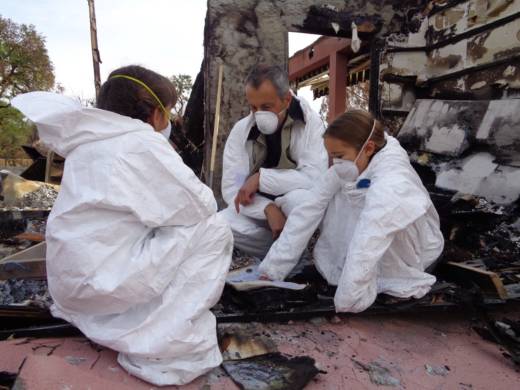This story is no longer being updated. Please visit kqed.org/wildfires for our latest wildfire-related stories and guides.
Returning to your home after a natural disaster can be very difficult – emotionally as well as practically. KQED gathered advice from FEMA, Sonoma County and Rob Goodman, who lost his home in the 2015 Valley Fire in Lake County, to help out those who have been given the OK to return to their residences.
“Some may not want to return, because of the difficulty of seeing your home and possessions in ashes. And seeing your neighbors’ homes gone as well,” Goodman said in fliers he created for survivors of natural disasters. “When we first returned to our street, we were shocked to see every home gone. Seeing our home in ashes left us feeling numb.”
“If you do decide to return I must urge great caution,” he added. “Your site will be toxic – containing everything from metals to plastics to wiring, plumbing, etc. Everything that was in your home will be melted and covered in ash.”
A checklist from FEMA and Sonoma County:
What to Bring/Wear
- Sturdy shoes (steel toes and shanks are recommended)
- Heavy-duty mask (at least an N95)
- Heavy-duty gloves
- Long pants and long-sleeve shirt
- Garden cultivator to sift through ashes
- 5-gallon bucket for any possessions
- Battery-powered radio to listen to emergency updates and news reports
- Battery-powered flashlight to inspect a damaged home
General tips
- Do not use your water if you suspect or have been told it is contaminated
- Keep hands clean and wear a mask if possible during an emergency to help prevent spread of COVID
- If your tap water is not safe to use, wash your hands with soap and water that has been boiled or disinfected or use a large water jug that contains clean water
- Foods exposed to fire can be compromised (including canned goods)
- Clean and sanitize your household after an emergency to help prevent the spread of illness and disease
- Hazardous chemicals and conditions may be present
- Inspect propane tanks for visible damage before turning on
- Be aware of slip, trip, fall and puncture hazards
- Watch out for animals, especially venomous snakes
- Watch for fallen objects including downed electrical wires; and try to stay aware of potential infrastructure impacts including weakened walls, bridges, roads and sidewalks

Before you enter your home
Take care around the outside and check for loose power lines, gas leaks and structural damage. If you have any doubts about safety, have your residence inspected by a qualified building inspector or structural engineer before entering.
Do not enter if:
- You smell gas
- Your home was damaged by fire and authorities have not declared it safe
- In the case of flooding, floodwaters remain around the building

